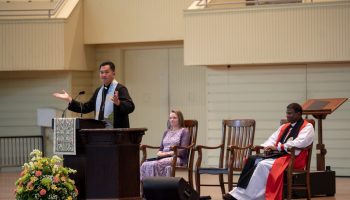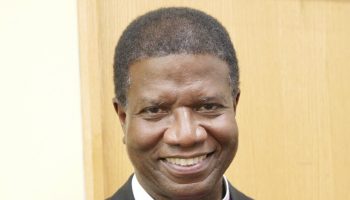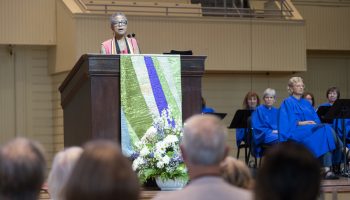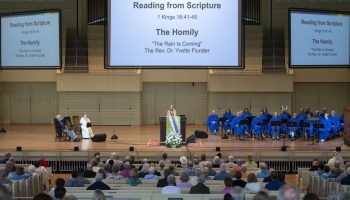“Do you trust me enough to do some spiritual excavation?” asked the Rev. Leslie D. Callahan. “I won’t ask you to do anything I am not willing to do. What is the worst thing you believe about yourself?”
Callahan gave the homily at 9:15 a.m. EDT Monday, Aug. 3, at the morning devotional service on the CHQ Assembly Video Platform. Her homily title was “Who Told You That?” The scripture text was Romans 8:1-11 (NRSV) —
“There is therefore now no condemnation for those who are in Christ Jesus. For the law of the Spirit of life in Christ Jesus has set you free from the law of sin and of death. For God has done what the law, weakened by the flesh, could not do: by sending his own Son in the likeness of sinful flesh, and to deal with sin, he condemned sin in the flesh, so that the just requirement of the law might be fulfilled in us, who walk not according to the flesh but according to the Spirit. Those who live according to the flesh set their minds on the things of the flesh, but those who live according to the Spirit set their minds on the things of the Spirit. To set the mind on the flesh is death, but to set the mind on the Spirit is life and peace. For this reason the mind that is set on the flesh is hostile to God; it does not submit to God’s law — indeed it cannot, and those who are in the flesh cannot please God. But you are not in the flesh; you are in the Spirit, since the Spirit of God dwells in you. Anyone who does not have the Spirit of Christ does not belong to him. But if Christ is in you, though the body is dead because of sin, the Spirit is life because of righteousness. If the Spirit of him who raised Jesus from the dead dwells in you, he who raised Christ from the dead will give life to your mortal bodies also through his Spirit that dwells in you.”
Callahan said she used to think she was lazy because she procrastinated. “I thought it was a sign that I did not want to do the work, but it is really a sign of perfectionism. I was afraid I would make mistakes, so I left things until the last minute because I was afraid I would get things wrong.”
She asked the congregation, “What about you? What is the worst thing you believe about yourself, and who told you that? Where did you get that idea?”
Divine disruptions are the work of ministry, and it is the work of ministry to disabuse people of the belief that they are limited to the worst thing they have ever done.
“We are mired in punishment, as if we will be better the more we berate ourselves. God has something different to say,” Callahan said.
Paul seemed to be struggling with his own failures in Romans, Chapter 8. Callahan said that people have a history of reading this chapter as a being about utter depravity. That reading has become part of many theological and public systems.
“I believe that Paul was wrestling with describing the change that had occurred in him through the work of Jesus Christ,” she said. “I don’t believe we are utterly depraved, because Verse 1 says there is no condemnation for those in Christ Jesus.”
She continued, “Condemnation is judgement with a penalty, a verdict (and) a sentence. We have been released from the judgment and penalty by Jesus Christ.”
For some in the church, living without judgement is nerve-wracking. They believe that judgement encourages people to do the right thing, otherwise most people would only act out of self-interest and selfishness.
Callahan said, “It was not freedom that made me procrastinate, it was judgement. Love frees us; not burdensome law, but love. God’s love is producing the right relationships and right love in us.”
She asked the congregation to return to the negative thing they thought about at the beginning of the sermon.
“Ask yourself, ‘Who told you that?’ and speak back to yourself, ‘God says there is no judgement. I am loved,’” Callahan said. “The journey of a right relationship begins not in fear but in grace, not in narrowness but broadness.”
She concluded with a verse from the hymn “Come Thou Fount of Every Blessing.”
“Oh, to grace how great a debtor / daily I’m constrained to be! / Let thy goodness, like a fetter, / bind my wandering heart to thee: / prone to wander, Lord, I feel it, / prone to leave the God I love; / here’s my heart, O take and seal it; seal it for thy courts above.”
The Rt. Rev. V. Gene Robinson, vice president of religion and senior pastor of Chautauqua Institution, presided from the Hall of Christ. Joshua Stafford, interim organist for Chautauqua Institution, played the Tallman Tracker Organ. Michael Miller, a Chautauqua Opera Apprentice Artist, served as vocal soloist. The organ prelude, performed by Stafford, was “Canzona solenne,” by Sigfrid Karg-Elert. Miller sang the hymn, “And Can It Be That I Should Gain.” The anthem was “Aria Semplice,” by Karg-Elert. Stafford played “Gagliarda,” by Karg-Elert, for the postlude. This program is made possible by the Jackson-Carnahan Memorial Chaplaincy and the Harold F. Reed, Sr. Chaplaincy.





